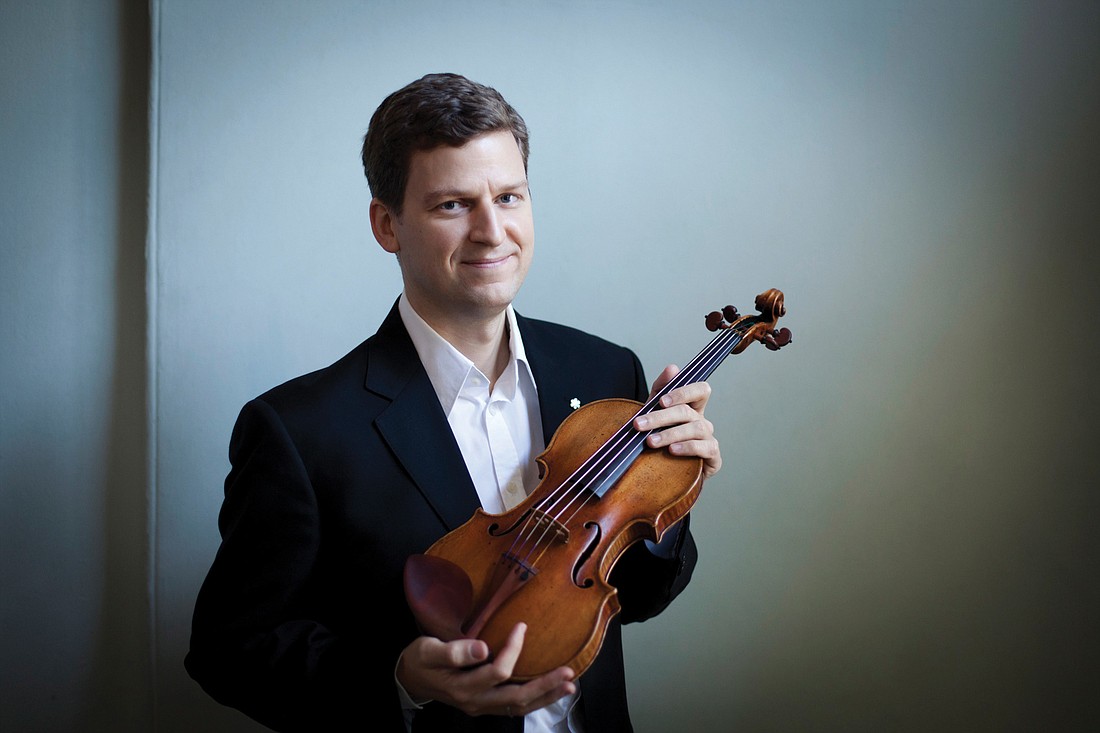- July 26, 2024
-
-
Loading

Loading

Clearly James Ehnes and Dimitri Shostakovich were the stars of the day in Jan. 6’s closing concert of the Masterworks 3 series by the Sarasota Orchestra.
I’ve never understood the so-called principals of censorship, especially as it applies to musical compositions, but Shostakovich and his music were subjected to such severe censorship during the reign of Stalin that his violin concerto lay dormant and unplayed until after Stalin’s death. It was premiered in 1955 by violinist David Oistrakh, and when James Ehnes was first coaching the work, through his pianist/coach he had access to the original piano score with markings by Shostakovich and Oistrakh.
None of this would be pertinent without the artistry of a violinist like Ehnes, who played this most challenging of violin works with accuracy, musicianship and elan, showing why he is one of the most sought after violinists today.
The concerto is a tour de force for soloist and orchestra, at once brooding and introspective, with an overriding mood of oppression that was thrust upon the peoples of the USSR. Even though some of the themes were gloriously romantic, that dark cloud was ever present.
Beginning with a virtual lamentation, the violin and orchestra are at once in a dialogue of hopeful longing ending with a virtual whimper of sound from violin, harp and celeste. In the scherzo-like second movement, the violin does its best to sound joyful, but the orchestra and then the soloist have that constant undertone of ever present suppression. The third movement is a passacaglia, with its repeating theme voiced first by the lower strings and tuba, leading to a sustained, mournful expression of hopelessness from the soloist, almost saying “Will it ever end?”
And end it does, in the joyful and lively fourth movement, which is in a much more festive mood, almost as if rejoicing at the death of Stalin and his oppression.
This music and its context are obviously a part of conductor Anu Tali’s heritage and culture, for her native Estonia was under such oppression for almost the first half of her life. The depth of feeling, phrasing, and passion that she and Ehnes gave us in this work seemed to be dragging up deep emotions and agonies of the type that are seldom, if ever, forgotten.
To say that Ehnes is a violinist is like saying that a Lamborghini is a car. Both are absolute virtuoso performers, but Ehnes is one of the most outstanding violinists I have ever heard. Every note is musical, real and full of meaning. His technique is seemingly flawless, and even in the craggy music of this concerto, he projects warmth and sincerity with a tone that can only be called sumptuous. He fully earned and deserved the enthusiastic standing ovation and call backs he received. His wisely chosen encore was a serene and quiet performance of the third movement of Bach’s Third Suite for Solo Violin.
The first half was devoted to two standards of the German symphonic literature, the overture to Mendelssohn’s “Midsummer Night’s Dream,” and the first “Spring” symphony by Robert Schumann.
Mendelssohn’s overture, written when he was 17, is a wonderful example of his fleet and shimmering style, but Tali led a rather heavy-handed performance that, although accurately played, seemed to miss the delicate essence and spirit of the piece.
Likewise, with the Schumann, which was given a straightforward performance in which the music didn’t seem to “breathe” as much as it should. Schumann was not good at orchestration, and the thick and brass-heavy sounds overbalanced the strings on several occasions. It is a substantial work and was well played, but one felt Tali was really anxious to get to the Shostakovich.
And yes, that performance of the Shostakovich — by soloist, conductor and orchestra — is something to be cherished for a long time.
A musical Lamborghini, perhaps.